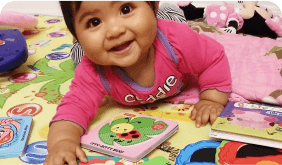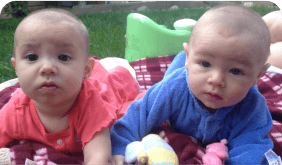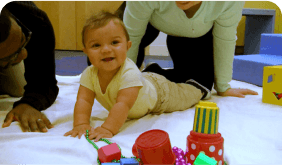As much as we wish baby could always be smiling and giggling, it is a fact of early life babies will cry—a lot. They will usually cry on a daily basis, and especially in their first few months of life. As a newborn, crying is a way of communicating with you about their basic needs.
While parents will learn what their baby’s cries mean as they grow, it can be difficult to know why baby is crying when they are around 0-3 months old. So why is your newborn crying, and how can you help address it?
We’ve gathered some of the most common reasons why newborn baby might be crying, and how to address baby’s needs.

Crying reason #1: Hunger or Overfeeding
Hunger is one of the most common reasons baby cries. To know if baby is hungry, look for hunger cues, such as:
Putting hand to mouth
Turning head toward breast or bottle
Clenching hands into fists
Smacking or licking lips
Opening mouth
If you suspect your baby might be hungry, then it’s time to feed them! Newborns typically feed every 1-3 hours (8-12 times per day), consuming about 2-3 ounces of breastmilk or formula per feeding. As baby grows, they typically can go longer between feedings.
Occasionally, babies will cry because they were overfed. Too much milk causes bloating, which can be temporarily uncomfortable for baby. Look for signs of fullness and stop feeding your baby when:
They close their mouth
They turn away from the breast or bottle
They relax their hands
They begin to fall asleep
Remember to burp baby after feeding is finished, to help with digestion and gas.
Crying reason #2: Fatigue
Another very common reason baby cries is because they’re exhausted. It can be tiring to be so tiny and cute!
Newborns need up to 17 hours of sleep every day, which means they get tired very frequently. This is because while they may not be able to do much on their own, their brain and body are developing rapidly.
If you suspect your baby might be tired, then help them fall asleep. Here are some tips to help them get the sleep they need:
No matter the time of day or length of sleep, always follow the ABCs of safe sleep.
Wrap them in a swaddle or try swaddling alternatives.
Try implementing a napping schedule to make sure they get all the sleep they need.
These tips for comforting a crying baby will also help them fall asleep.
Crying reason #3: Dirty diaper
It is very common for baby to have a dirty diaper. The feeling of a full diaper on their skin can be irritating and upsetting, which can lead to crying.
Be sure to change diapers as soon as you are able, especially if there is stool in the diaper. Parents can usually tell if there is stool in the diaper by detecting a scent. Typically, babies need their diaper changed every 2-3 hours.
On diapers for younger babies, there may be an indicator strip in the front that turns blue when baby has urinated. This can help caregivers know when baby’s diaper needs to be changed.
Watch for tips to make changing baby’s diaper easier:
Crying reason #4: Internal temperature
If baby is overheated or cold, they may be uncomfortable and will try to communicate through crying. This can happen if they are swaddled in a thick blanket, or if they’re wearing a jacket while in a car seat. Baby should have a jacket they wear in their car seat that is different from a typical winter jacket: one that is not too puffy and doesn’t cause them to overheat. You can also remove baby’s jacket, and then place it over them once they are in their car seat.
Make sure that baby is sleeping in a cool environment, and has proper covering on their body. They should also stay in the shade when outdoors, or bundle up for cold weather.
Crying reason #5: Pain
Babies sometimes get infections or irritations that can cause discomfort, which can lead to crying. Conditions like earaches, teething, or diaper rash can cause pain. Many of these conditions can be treated by a medical professional. A healthcare provider should be consulted if you suspect baby is in pain or has an infection.
There are many other reasons why baby may be crying outside of the above list. Some of these reasons include:
Overstimulation: Stimulation helps baby learn and experience new things, but too much stimulation (perhaps too many sights and sounds that they are not used to, or too much time spent with a new sensory experience) can be overwhelming and lead to fussiness and crying.
Wanting attention or engagement: Baby may cry if they want to play, or haven’t used enough energy between periods of sleeping.
Attachment: Baby may cry if they feel anxious or fearful if they can’t find you (even if you’re just a few feet away!). Sometimes they are looking for the caregiver to address one of the previously listed basic needs, such as a diaper change or feeding.
These reasons for crying are usually temporary and can be addressed directly.
It is normal and common for caregivers to feel stressed and frustrated when baby cries, especially if they cry frequently or for long periods of time. It’s important to remember that when baby cries like this, they are not upset with you. They’re just having a tough time expressing themselves and understanding how they feel.
If baby’s caregiver stays calm, this may help baby in calming down as well, or at least not becoming more upset.
If you’re dealing with a crying infant and trying to remain calm yourself, you can try:
Taking deep, slow breaths
Placing baby in their crib to allow yourself a break
Putting on some light music to create a soothing environment
Getting some sleep (even though this can be very hard for new parents!)
If you’re addressing all of baby’s basic needs and they are still crying frequently, consider consulting a healthcare provider for support and guidance.





